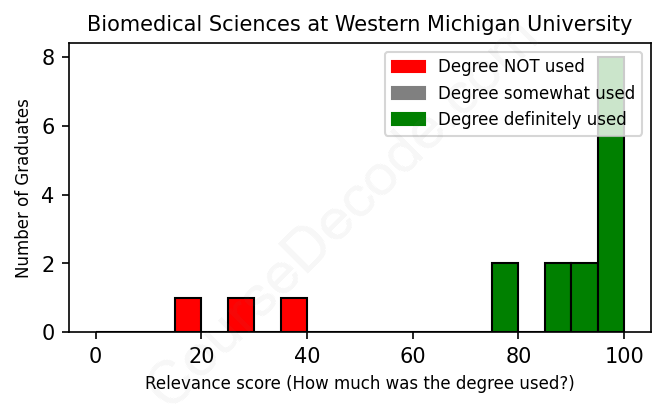
First, some facts. Of the Biomedical Sciences graduates from Western Michigan University we've analyzed , here's how many have used (or NOT used) their degree in their career:

These are estimates based on AI analysis of 17 LinkedIn profiles (see below).
The verdict? Significantly above average. Overall, with an average relevance score of 81%, Biomedical Sciences graduates from Western Michigan University have a much higher likelihood (+14%) of finding work in this field compared to the average graduate across all fields:
And for comparison, here's the chart for all profiles we've looked at across all degrees.
Also, after graduating, 47% of these graduates have pursued further education other than another Bachelor's degree (such as a Masters degree or other), compared to the average across all profiles of 35%. This suggests you may need more than just a Bachelors degree to be competitive as a Biomedical Sciences graduate.
See the details:
|
Relevance score: 26% We think this person has NOT gone into a career related to their degree. We think this person has NOT gone into a career related to their degree.
DEGREE INFOGraduated in 2022 from Western Michigan University with a Bachelor of Science - BS in Biomedical Sciences. No other secondary education since. JOB HISTORY SINCE GRADUATIONSales Associate Riverside Payments Jan 2022 - May 2022 Order Picker  Home Depot Distribution Ctr May 2022 - Feb 2023 Segmentation Technician  Stryker Mar 2023 - Aug 2023 Sales Specialist  Verizon Oct 2023 - Mar 2024 Senior Segementation Representative  Stryker Mar 2024 - Present ABOUTHello! I am [NAME REMOVED] Rogers, and I am a graduate of Biomedical Sciences from Western Michigan University, with a minor in Chemistry. I plan on trying to start my career in Medical Sales. |
The top 10 most common jobs done by the graduates we've analyzed (ranked most common to least) are:
After looking through the different jobs that people who graduated with a Biomedical Sciences degree from Western Michigan University have taken on, it seems like many of them choose paths directly related to healthcare and clinical work. A significant number have moved into roles as Physician Assistants, which directly use the medical knowledge and skills gained through their studies. Other popular positions include roles like Clinical Study Associate and Medical Scribe, where an understanding of medical terms and patient care procedures is crucial. These positions leverage the relevant background in Biomedical Sciences and offer practical applications of their education.
However, it’s clear that not everyone stays within the realm of Biomedical Sciences. There are a handful of graduates who have taken on jobs that feel pretty far from their degree, like sales or administrative roles. While some positions, like Quality Control Chemist or Lab Technician, are closely tied to the skills learned, others, like being a Housing Desk Assistant or an Account Executive, don’t really require any specific biomedical knowledge. So, while many graduates find relevant work, there are definitely instances where their jobs don’t perfectly align with their studies in Biomedical Sciences, creating a mixed bag of experiences in the job market.
Here is a visual representation of the most common words in job titles for Biomedical Sciences graduates (this is across all Biomedical Sciences graduates we've analyzed, not just those who went to Western Michigan University):

From the profiles of Biomedical Sciences graduates at Western Michigan University, it's clear that these individuals have taken a variety of paths after completing their degrees. For those just starting out, many seem to land roles that are fairly established within the healthcare sector, like phlebotomists, medical scribes, and lab technicians. These positions often serve as a stepping stone, allowing graduates to gain practical experience in clinical settings, which is super valuable as they start their careers. For instance, a number of graduates have transitioned into more advanced roles such as physician assistants or have taken on quality control and laboratory positions in reputable companies like Stryker and Pfizer. This suggests a solid flow of entry-level roles leading to promotions or more specialized work within healthcare and pharmaceuticals.
Looking further down the line, say around five to ten years after graduation, many graduates seem to be moving up the ranks or pivoting into exciting areas. Several are now working as physician assistants or involved in pharmaceutical analysis, which are pretty commendable roles. Others have taken on positions like biochemistry scientists and data analysts, indicating a trend towards more analytical and research-oriented careers. While there are a few who’ve ventured into roles that are less connected to the field of Biomedical Sciences, like in sales or communications, the overall trajectory feels promising. It appears that a solid majority of these graduates find ways to leverage their Biomedical Sciences background into fulfilling careers that stay relevant to their education. So, if you’re considering this major, it looks like it can lead you to some pretty great opportunities down the line!
Honestly, a Bachelor’s degree in Biomedical Sciences, whether at Western Michigan University or elsewhere, can be pretty challenging. It involves a lot of rigorous coursework in subjects like biology, chemistry, and physics, along with lab work that can be quite demanding. You’ll definitely need to stay on top of your studies and manage your time well, especially when it comes to exams and projects. While some students find certain classes easier than others, the overall curriculum is designed to be intensive, so it’s not exactly a walk in the park. That said, if you’re passionate about the subject and put in the effort, it can be a rewarding experience!
Most commonly, in the LinkedIn profiles we've looked at, it takes people 4 years to finish a Bachelor degree in Biomedical Sciences.
So, looking at these graduates from Western Michigan University, it seems like the money situation varies quite a bit. Those who went into fields like Physician Assistant, especially in multiple roles, likely have made decent salaries, probably upwards of $70-100k a year based on average earnings in that profession. Meanwhile, some positions like adjunct faculty or phlebotomist typically bring in lower wages, possibly below $50k, especially if they’re splitting time in part-time roles. Others in pharmaceutical and biochemistry roles seem to be in a better spot too, especially at big companies like Pfizer and Stryker, which usually pay pretty well. Overall, it looks like some graduates are doing quite nicely, while others are still trying to find their financial footing in the job market.
Here is a visual representation of the most common words seen in the "about" section of LinkedIn profiles who have a Bachelor degree in Biomedical Sciences (this is across all Biomedical Sciences graduates we've analyzed, not just those who went to Western Michigan University). This may or may not be useful:

Here are all colleges offering a Bachelor degree in Biomedical Sciences (ordered by the average relevance score of their Biomedical Sciences graduates, best to worst) where we have analyzed at least 10 of their graduates:
| College | Score | Count |
|---|---|---|
 Western Michigan University Western Michigan University
|
81 | 17 |
 Marquette University Marquette University
|
78 | 29 |
 University of Michigan University of Michigan
|
77 | 10 |
 Colorado State University Colorado State University
|
77 | 19 |
 University at Buffalo University at Buffalo
|
75 | 18 |
 California Polytechnic State University-San Luis Obispo California Polytechnic State University-San Luis Obispo
|
74 | 13 |
 University of Connecticut University of Connecticut
|
74 | 15 |
 Texas A&M University Texas A&M University
|
73 | 59 |
 Auburn University Auburn University
|
71 | 26 |
 Northern Arizona University Northern Arizona University
|
71 | 15 |
 Rensselaer Polytechnic Institute Rensselaer Polytechnic Institute
|
70 | 10 |
 University of Central Florida University of Central Florida
|
69 | 26 |
 University of South Florida University of South Florida
|
68 | 48 |
 Georgia Institute of Technology Georgia Institute of Technology
|
67 | 41 |
 The Ohio State University The Ohio State University
|
64 | 14 |
 Rochester Institute of Technology Rochester Institute of Technology
|
64 | 12 |
 Case Western Reserve University Case Western Reserve University
|
63 | 12 |
 Grand Valley State University Grand Valley State University
|
59 | 35 |
 Arizona State University Arizona State University
|
58 | 12 |